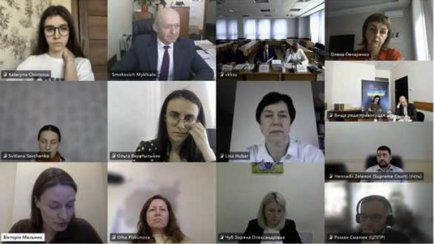Contact center of the Ukrainian Judiciary 044 207-35-46

President of the Administrative Cassation Court within the Supreme Court Mykhailo Smokovych, Deputy Head of the Department for Analytical and Legal Work of the Supreme Court Hennadii Zelenov and Head of the Division for International Cooperation of the Supreme Court Lina Hubar took part in the discussion on the results of the report ‘Review of Ukrainian Democratic Institutions during the Wartime: Judiciary (2024)’, during which the key results of the assessment of the judicial system in 2024 were presented.
Speaking about the system of administrative courts as part of the discussion of the Judiciary section of the report, Mykhailo Smokovych noted that despite the full-scale invasion of Ukraine by Russia, only the Kherson District Administrative Court is currently not functioning. At the same time, all other courts of administrative jurisdiction continue to fulfil their constitutional duty to ensure the right to judicial protection of every person in Ukraine, despite the numerous challenges and problems detailed in the report. He also expressed his gratitude to the authors of the report for the content and comprehensive coverage of issues related to staffing, functioning of the court's staff and remuneration of court employees.
The Head of the SC AdmCC focused on the issue of the workload of administrative courts. He informed that in 2024, the Court processed more than 52 thousand cases and materials. For comparison: The Federal Administrative Court of Germany, with 56 judges, considers about 1800 cases per year. This clearly demonstrates the intensity of the work of administrative courts in Ukraine. At the same time, the speaker noted the active participation of judges in various events, including official negotiations on Ukraine's accession to the European Union, stressing the importance of this cooperation.
Speaking about the improvement of procedural legislation, Mykhailo Smokovych suggested that this issue should be given due attention in the report. He pointed out the existence of problematic aspects, especially in relation to the institute of exemplary cases, noting the need to update and improve the mechanisms for their consideration.
Regarding the digitalisation of judicial proceedings, the President of the Administrative Cassation Court of the Supreme Court stated that there is a lack of funding to fully provide courts with the necessary resources. According to the speaker, some districts do not even have proper internet coverage.
The issue of enforcement of court decisions in administrative cases also remains problematic, mainly due to lack of funds. The speaker said that there are situations when there are no managers in the structural units of the Pension Fund of Ukraine at the regional level due to the failure to comply with court decisions on establishing reporting. In the opinion of the Head of the SC AdmCC, sanctions against such managers are somewhat unfair, as they do not comply with the decision due to lack of funding. This issue also needs to be addressed. ‘Undoubtedly, the state's attention to the enforcement of court decisions is a positive signal, but it is also necessary to create the appropriate conditions for those who enforce these decisions,’ the speaker stressed.
Finally, Mykhailo Smokovych drew attention to the critical shortage of judicial personnel, which remains one of the most acute problems. At the same time, he positively noted the practice of appointing judges by the President of Ukraine, which contributes to the restoration of the judiciary.
The event was organised by Democracy Reporting International as part of the Democratic Accession, Resilience and Engagement (Ukraine-DARE) project, which DRI implements jointly with its partners the Reanimation Package of Reforms Coalition and the Centre of Policy and Legal Reform with the financial support of the German Federal Foreign Office.
For reference. DRI is an international non-governmental organisation that works to strengthen democracy through impartial analysis and expertise, working with civil society, government, experts and local authorities.
Since 2022, DRI and its partners have been assessing the functioning of Ukraine's democratic institutions during the war. Experts have prepared an annual report for 2024, which includes an analysis of the effectiveness of key institutions, the judiciary, electoral legislation, and human rights during the war.